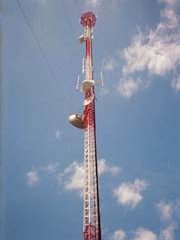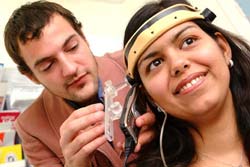Communications Media
Engineering and research-driven innovations in the field of communications are addressed here, in addition to business developments in the field of media-wide communications.
innovations-report offers informative reports and articles related to interactive media, media management, digital television, E-business, online advertising and information and communications technologies.

Babel speech Technology for the Owasys22C mobile telephone
The Owasys company in Zamudio has chosen Babel technology, world leader and pioneer in speech technologies, for its new Owasys22C mobile telephone. This mobile phone has been designed and developed by Owasys specifically for those persons who are blind or visually impaired. Initially the Owasys22C will have the Spanish and English version of Babel so that other languages can be added afterwards.
The launching of the Owasys22C on to the market will enable the visually impaired and the blind t

New ways to talk to your computer
Scientists explore how we could interact with computers
Imagine ordering your meal in a restaurant by a simple tap on the table, transmitting your choice direct to the kitchens. Or placing an order for goods by making your selection on the surface of the shop window.
It may sound like science fiction, but this could be the way we interact with computers in the future, thanks to a pan-European research project, led by experts at Cardiff University, Wales, UK.
“The v

You Can Hear Me Now: Software Brings Cellular Capacity To Rural Communities
Researchers have successfully tested a system that can replace a cellular tower’s room full of communications hardware with a single desk-top style computer, making the technology affordable for small, rural communities.
The software is also capable of running emergency communications-such as police, fire and ambulance channels-on the same device as the civilian system, eliminating the need for a separate network of emergency communications towers.
“Rural customers are the firs

Johns Hopkins APL Creates System to Detect Digital Video Tampering
The Johns Hopkins University Applied Physics Laboratory (APL) in Laurel, Md., has opened the door to using reliable digital video as evidence in court by developing a system that identifies an attempt to alter digital video evidence.
“It’s not too hard to make changes to digital video,” says Tom Duerr, APL’s project manager. “But our system quickly and conclusively detects any alterations made to the original tape.” For the past two years Duerr has led development of the project for th

Study to assess the effects of mobile phones on hearing nears end of first phase
Scientists at the Institute of Sound and Vibration Research (ISVR) at the University of Southampton are nearing the end of the first phase of a study to assess whether the use of mobile phones has any adverse effect on the hearing of healthy young adults.
The study into Potential Adverse Effects of GSM Cellular Phones on Hearing (known by the acronym GUARD) is part of a joint European project funded by the European Commission being carried out simultaneously in several countries across Europ

Say goodbye to your mouse, keyboard and phone number – voice control is finally taking over
Using phone numbers, remote controls and computer keyboards will likely seem quaint within a decade as new capability to turn human speech into accurate, efficient computer code radically changes the ways we live and work.
That’s the outlook of Lawrence R. Rabiner, associate director of the Center for Advanced Information Processing (CAIP) at Rutgers, The State University of New Jersey, in an overview of speech processing, “The Power of Speech,” in the journal Science, available Friday